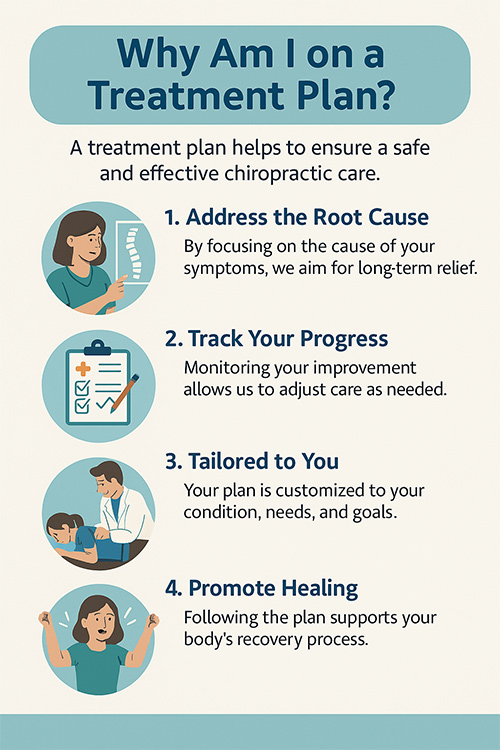Why Am I on a Treatment Plan?
If you’ve started chiropractic care and your doctor has recommended a treatment plan, you might be wondering why. Can’t you just come in when it hurts? Why the schedule? Why the plan?
Great questions! Let’s break it down so you feel confident and informed about your care.

Treatment Isn’t One-and-Done
When your spine or joints aren’t moving correctly, it can create stress and tension in your body. You might feel pain, stiffness, or other symptoms. Chiropractic adjustments help restore normal movement, but healing doesn’t usually happen instantly. A treatment plan gives your body time to respond and helps your results stick.
Think of it like going to the gym or physical therapy, progress builds over time, not in one visit.
Your Body Needs Time to Heal
Your chiropractor creates a treatment plan based on your unique condition, how long it’s been bothering you, and how your body responds to care. Some conditions need more frequent visits at the beginning to stabilize the area and reduce symptoms. As things improve, visits are usually spaced further apart.
Skipping visits or stopping too soon can cause symptoms to return or slow your recovery.
It’s More Than Just Pain Relief
Pain is often the last thing to show up, and the first thing to go away. That doesn’t mean the underlying problem is completely fixed. Your treatment plan is designed to correct the issue, not just cover up the symptoms. Following the full plan helps you stay healthier, feel better, and reduce the risk of future flare-ups.
What Happens When I Finish the Plan?
Once your initial phase of care is complete, your chiropractor may recommend occasional visits to help maintain the improvements you’ve made. This kind of wellness or maintenance care is highly recommended and can be extremely helpful in keeping you feeling your best.
You’re in Control of Your Care
Chiropractic treatment plans are always tailored to you, and the best results come from following your treatment plan. Your doctor will check in with you regularly, review your progress, and adjust the plan as needed. If you have questions or concerns, speak up. Your care should be a team effort.

